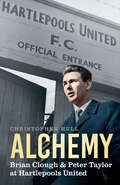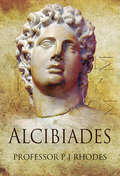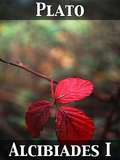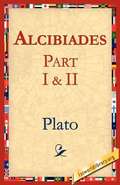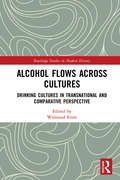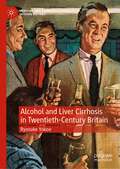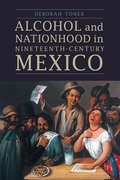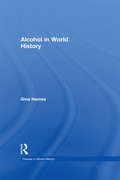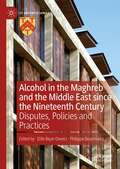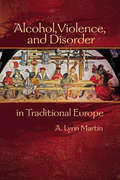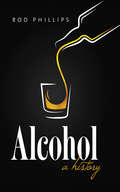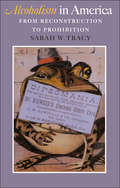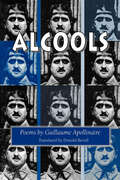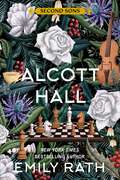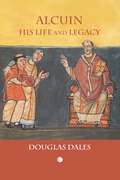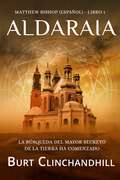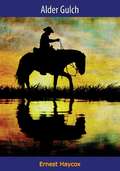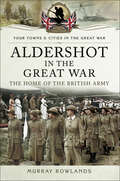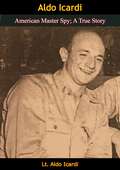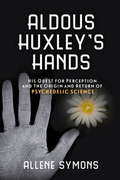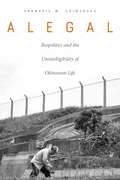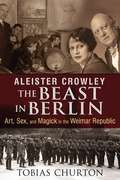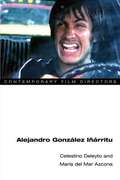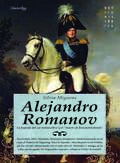- Table View
- List View
Alchemy: Brian Clough & Peter Taylor at Hartlepools United
by Christopher HullAlchemy reveals the bittersweet reality of Brian Clough and Peter Taylor’s first management job together. The lower-league Hartlepools United are penniless, with a meddling chairman, a ramshackle ground and want-away players. Yet the management pair tackle every challenge head-on, forging a winning blueprint that later transforms unfashionable Derby County and Nottingham Forest into League and European Cup champions.Exploiting a wealth of archive newspapers, plus interviews with those present at the creation, Alchemy exposes the humble origins of Clough & Taylor’s meteoric rise to the top of the football tree.
Alcibiades
by P. J. RhodesWhile the Americans were fighting in Vietnam, a struggle of even greater strategic significance was taking place in the Middle East: the Sultanate of Oman guards the entrance to the Arabian Gulf, and thus controls the movement of oil from that region. In the 1960s and 70s, the Communists tried to seize this artery and, had they succeeded, the consequences for the West and for the Middle East would have been disastrous — and yet, few people have ever heard of this geo-political drama at the height of the Cold War.In the Service of the Sultan tells, first-hand, the largely unknown story of a small number of British officers who led Muslim soldiers in this hard-fought anti-insurgency war which has shaped todays Gulf. After outlining the historical, geographical and political background, the book describes military action in a stark and mountainous environment, including operations with irregular forces and the SAS as well as action in the air and at sea. The book gives a gripping, moving, funny account of all these and paints a powerful and illuminating picture of the realities of war.It will appeal to all who are interested in the Cold War and relationships between the Western and the Arab worlds. Politics, history, irregular warfare, religion, international affairs: all are ingredients in this absorbing, informative read. In the light of the current insurgencies in Iraq and Afghanistan, it is also timely to be reminded how a rare victory was won over Communist guerrillas.
Alcibiades I
by PlatoThe First Alcibiades or Alcibiades I is a dialogue featuring Alcibiades in conversation with Socrates. It is ascribed to Plato, although scholars are divided on the question of its authenticity.
Alcibiades II
by PlatoThe Second Alcibiades or Alcibiades II (Greek: Ἀλκιβιάδης βʹ) is a dialogue traditionally ascribed to Plato. In it, Socrates attempts to persuade Alcibiades that it is unsafe for him to pray to the gods if he does not know whether what he prays for is actually good or bad for him. <P> <P> There is dispute amongst scholars about the text's authenticity, and it is generally considered apocryphal.[1] The main criticisms of its authenticity revolve around its defective arguments, lack of humor, and style; those who consider it inauthentic date its composition to the 3rd or 2nd centuries BCE.
Alcohol Flows Across Cultures: Drinking Cultures in Transnational and Comparative Perspective (Routledge Studies in Modern History)
by Waltraud ErnstThis book maps changing patterns of drinking. Emphasis is laid on the connected histories of different regions and populations across the globe regarding consumption patterns, government policies, economics and representations of alcohol and drinking. Its transnational perspective facilitates an understanding of the local and global factors that have had a bearing on alcohol consumption and legislation, especially on the emergence of particular styles of ‘drinking cultures’. The comparative approach helps to identify similarities, differences and crossovers between particular regions and pinpoint the parameters that shape alcohol consumption, policies, legal and illegal production, and popular perceptions. With a wide geographic range, the book explores plural drinking cultures within any one region, their association with specific social groups, and their continuities and changes in the wake of wider global, colonial and postcolonial economic, political and social constraints and exchanges.
Alcohol and Liver Cirrhosis in Twentieth-Century Britain (Medicine and Biomedical Sciences in Modern History)
by Ryosuke YokoeThe relationship between alcohol consumption and liver cirrhosis has long been contested by doctors and medical professionals, creating numerous implications for the public reputation of alcohol in Britain. Despite this, it was not until the 1970s that cirrhosis came to be understood as an ‘alcoholic disease’. This book contextualises developments in this debate through the twentieth century by examining the significant influence that medical expertise had on policy responses to alcohol misuse, as well as the social reputation of alcohol consumption. It demonstrates how the degree to which drinking was seen to be responsible for liver disease directly shaped how different groups, such as the temperance movement and the drinks industry, exaggerated or downplayed the destructive properties of alcohol. Covering a series of themes including the science of disease causation, the social standing of medical expertise, and alcohol and public health policy, this book argues that in order to properly understand the trajectory of debates around drinking we need to consider the twentieth-century ‘alcohol problem’ as primarily a medical issue. Contrary to the tendency by existing works to disassociate perceptions and responses to alcohol use from the objective knowledge of its effects on the body, this book shows that medical understandings of liver disease influenced how alcohol was conceptualised in relation to its harms. Offering a fresh perspective on the interaction between scientific knowledge and policy during the twentieth century, this book provides insights for those researching the social, political and cultural history of modern Britain, as well as historians of medicine and health.
Alcohol and Nationhood in Nineteenth-Century Mexico (The Mexican Experience)
by Deborah TonerDrawing on an analysis of issues surrounding the consumption of alcohol in a diverse range of source materials, including novels, newspapers, medical texts, and archival records, this lively and engaging interdisciplinary study explores sociocultural nation-building processes in Mexico between 1810 and 1910. Examining the historical importance of drinking as both an important feature of Mexican social life and a persistent source of concern for Mexican intellectuals and politicians, Deborah Toner’s Alcohol and Nationhood in Nineteenth-Century Mexico offers surprising insights into how the nation was constructed and deconstructed in the nineteenth century. Although Mexican intellectuals did indeed condemn the physically and morally debilitating aspects of excessive alcohol consumption and worried that particularly Mexican drinks and drinking places were preventing Mexico’s progress as a nation, they also identified more culturally valuable aspects of Mexican drinking cultures that ought to be celebrated as part of an “authentic” Mexican national culture. The intertwined literary and historical analysis in this study illustrates how wide-ranging the connections were between ideas about drinking, poverty, crime, insanity, citizenship, patriotism, gender, sexuality, race, and ethnicity in the nineteenth century, and the book makes timely and important contributions to the fields of Latin American literature, alcohol studies, and the social and cultural history of nation-building.
Alcohol in World History (Themes in World History)
by Gina HamesFrom the origins of drinking to the use and abuse of alcohol in the present day, this global historical study draws on approaches and research from biology, anthropology, sociology and psychology. Topics covered include: the impact of colonialism alcohol before the world economy industrialization and alcohol globalization, consumer society, and alcohol. Gina Hames argues that the production, trade, consumption, and regulation of alcohol have shaped virtually every civilization in numerous ways. It has perpetuated the development of both domestic and international trade; helped create identity and define religion; provided a tool for oppression as well as a tool for cultural and political resistance; and has supplied governments with essential revenues as well as a means of control over minority groups. Alcohol in World History is one of the first studies to pull together such a wide range of sources in order to compare the role of alcohol throughout time and across both western and non-western civilizations.
Alcohol in the Maghreb and the Middle East since the Nineteenth Century: Disputes, Policies and Practices (St Antony's Series)
by Elife Biçer-Deveci Philippe BourmaudThis book explores the significance of alcohol in the Middle East and Maghreb as a powerful catalyst of social and political division. It shows that the solidarities and polarities created by disputes over alcohol are built on arguments far more complex than oppositions on religion or consumption alone. In a region in which alcohol is banned by Islamic rules, yet allows its production and consumption, alcohol has always been contentious. However, this volume examines the different forms of social authority – religious, cultural and political – to offer a new understanding of drinking behaviours in the Middle East and North Africa. It suggests that alcohol, being at the same time an import and product of local industry, epitomises the tensions inherent to the conforming of Islamic societies to global trends, which seek to redefine political communities, social hierarchies and gender roles. The chapters challenge common misconceptions about alcohol in this region, arguing instead that medical discourses on alcohol dependency hide stances on national independence in an imperialist context; that the focus on religion also tends to conceal disputes on alcohol as a social struggle; and that disputes on inebriation are more about masculinity than judging private leisure. In doing so, the volume presents alcohol as a way of grasping the power relations that structure the societies of the Middle East and Maghreb.
Alcohol, Violence, and Disorder in Traditional Europe (Early Modern Studies #2)
by A. Lynn MartinTraditional Europe had high levels of violence and of alcohol consumption, both higher than they are in modern Western societies, where studies demonstrate a link between violence and alcohol. A. Lynn Martin uses an anthropological approach to examine drinking, drinking establishments, violence, and disorder, and compares the wine-producing south with the beer-drinking north and Catholic France and Italy with Protestant England, and explores whether alcohol consumption can also explain the violence and disorder of traditional Europe.Both Catholic and Protestant moralists believed in the link, and they condemned drunkenness and drinking establishments for causing violence and disorder. They did not advocate complete abstinence, however, for alcoholic beverages had an important role in most people's diets. Less appreciated by the moralists was alcohol's function as the ubiquitous social lubricant and the increasing importance of alehouses and taverns as centers of popular recreation.The study utilizes both quantitative and qualitative evidence from a wide variety of sources to question the beliefs of the moralists and the assumptions of modern scholars about the role of alcohol and drinking establishments in causing violence and disorder. It ends by analyzing the often-conflicting regulations of local, regional, and national governments that attempted to ensure that their citizens had a reliable supply of good drink at a reasonable cost but also to control who drank what, where, when, and how.No other comparable book examines the relationship of alcohol to violence and disorder during this period.
Alcohol, Violence, and Disorder in Traditional Europe (Early Modern Studies)
by A. Lynn MartinTraditional Europe had high levels of violence and of alcohol consumption, both higher than they are in modern Western societies, where studies demonstrate a link between violence and alcohol. A. Lynn Martin uses an anthropological approach to examine drinking, drinking establishments, violence, and disorder, and compares the wine-producing south with the beer-drinking north and Catholic France and Italy with Protestant England, and explores whether alcohol consumption can also explain the violence and disorder of traditional Europe.Both Catholic and Protestant moralists believed in the link, and they condemned drunkenness and drinking establishments for causing violence and disorder. They did not advocate complete abstinence, however, for alcoholic beverages had an important role in most people's diets. Less appreciated by the moralists was alcohol's function as the ubiquitous social lubricant and the increasing importance of alehouses and taverns as centers of popular recreation.The study utilizes both quantitative and qualitative evidence from a wide variety of sources to question the beliefs of the moralists and the assumptions of modern scholars about the role of alcohol and drinking establishments in causing violence and disorder. It ends by analyzing the often-conflicting regulations of local, regional, and national governments that attempted to ensure that their citizens had a reliable supply of good drink at a reasonable cost but also to control who drank what, where, when, and how.No other comparable book examines the relationship of alcohol to violence and disorder during this period.
Alcohol: A History
by Rod PhillipsWhether as wine, beer, or spirits, alcohol has had a constant and often controversial role in social life. In his innovative book on the attitudes toward and consumption of alcohol, Rod Phillips surveys a 9,000-year cultural and economic history, uncovering the tensions between alcoholic drinks as healthy staples of daily diets and as objects of social, political, and religious anxiety. In the urban centers of Europe and America, where it was seen as healthier than untreated water, alcohol gained a foothold as the drink of choice, but it has been more regulated by governmental and religious authorities more than any other commodity. As a potential source of social disruption, alcohol created volatile boundaries of acceptable and unacceptable consumption and broke through barriers of class, race, and gender.Phillips follows the ever-changing cultural meanings of these potent potables and makes the surprising argument that some societies have entered "post-alcohol" phases. His is the first book to examine and explain the meanings and effects of alcohol in such depth, from global and long-term perspectives.
Alcoholism in America: From Reconstruction to Prohibition
by Sarah W. TracyDespite the lack of medical consensus regarding alcoholism as a disease, many people readily accept the concept of addiction as a clinical as well as a social disorder. An alcoholic is a victim of social circumstance and genetic destiny. Although one might imagine that this dual approach is a reflection of today's enlightened and sympathetic society, historian Sarah Tracy discovers that efforts to medicalize alcoholism are anything but new.Alcoholism in America tells the story of physicians, politicians, court officials, and families struggling to address the danger of excessive alcohol consumption at the turn of the century. Beginning with the formation of the American Association for the Cure of Inebriates in 1870 and concluding with the enactment of Prohibition in 1920, this study examines the effect of the disease concept on individual drinkers and their families and friends, as well as the ongoing battle between policymakers and the professional medical community for jurisdiction over alcohol problems. Tracy captures the complexity of the political, professional, and social negotiations that have characterized the alcoholism field both yesterday and today.Tracy weaves American medical history, social history, and the sociology of knowledge into a narrative that probes the connections among reform movements, social welfare policy, the specialization of medicine, and the social construction of disease. Her insights will engage all those interested in America's historic and current battles with addiction.
Alcools: Poems (Wesleyan Poetry Series)
by Guillaume ApollinaireA new translation of this complex and beautiful poetry.Alcools, first published in 1913 and one of the few indispensable books of twentieth-century poetry, provides a key to the century's history and consciousness. Champion of &“cubism&”, Guillaume Apollinaire (1880-1918) fashions in verse the sonic equivalent of what Picasso accomplishes in his cubist works: simultaneity. Apollinaire has been so influential that without him there would have been no New York School of poetry and no Beat Movement. This new translation reveals his complex, beautiful, and wholly contemporary poetry. Printed with the original French on facing pages, this is the only version of this seminal work of French Modernism currently available in the United States.
Alcott Hall (Second Sons)
by Emily RathA spicy, smart, standalone &“Why Choose&” Regency romance set three years after the events of the Second Sons duology from New York Times bestselling author Emily Rath.The Lady has an offer. The Vicar has a confession. The Game Warden has a secret. When her late aunt leaves her a generous fortune, socially awkward Lady Madeline Blaire believes she&’s finally found a way out of the high society husband hunt. There&’s only one problem. To claim it, Madeline must marry by New Year&’s Eve . . . which is now only 3 weeks away! Determined to claim her financial freedom, Madeline slips away from her overbearing family and races off to Alcott Hall. Madeline needs a husband. Now. She&’ll be generous, providing him with a comfortable living. She doesn&’t even care if he takes other lovers. All he must do is agree never to claim his rights as her husband. 3 years ago, vicar Charles Bray left the town of Finchley and never looked back. When duty calls him home, he returns heavy hearted, desperate to avoid one man—John Warren, game warden of Alcott Hall. As Charles does his best to evade Warren&’s snare, he starts an unlikely friendship with Lady Madeline, who soon makes him an offer too good to refuse. Charles and Madeline could have everything they want . . . if only Warren will stay out of way. But Warren holds a secret that could up-end all their careful plans. Does Madeline want a comfortable life married to a kind vicar? Or will she dare to risk it all on the penniless warden? Perhaps there&’s a third option none of them dreamed possible. An option where no one has to choose . . .
Alcuin: His Life and Legacy
by Douglas DalesScholar, ecclesiastic, teacher and poet of the eighth century, Alcuin was a person of deep Christian faith, tenacious in his loyalty to orthodox Catholic theology. He had a seminal influence upon his own generation and those that came after him. Althoughhe remained a Northumbrian Christian at heart, the part of his life about which most is known was spent on the Continent. He never lost contact with his homeland; but his most significant and lasting work was evidently accomplished in Europe and his influence on the early medieval Western Church was an abiding one. This book examines his life and career in England and on the continent; it also considers his legacy as a churchman and a leading political figure. This volume prefigures a forthcoming work onAlcuin's intellectual legacy, 'Alcuin : A Study of his Theology' (due for release, April 2013). This rich study is intended for the general reader as well as for those studying, teaching or researching this period of early medieval history and theology in schools and universities.
Aldaraia (Matthew Bishop (Español) #1)
by Burt ClinchandhillLa búsqueda del mayor secreto de la Tierra ha comenzado. •GANADOR: Premio Pinnacle a la excelencia literaria, Invierno 2021 - Mejor novela de suspenso "El suspenso es monumental, la historia nunca se ralentiza, y tiene ese don mágico de difuminar las líneas de lo aparentemente imposible con algo que casi parece que podría estar basado en la verdad absoluta (AKA, El Código Da Vinci)." ~ Reseñas de libros de Feathered Quill, Amy Lignor, VERDADERO HIGH-FIVE Cuando el padre de Jennifer Porter muere de una misteriosa enfermedad, ella hereda un libro de 400 años de antigüedad, titulado Aldaraia sive Soyga voco'r, escrito en una lengua desconocida que su padre había estado intentando descifrar antes de morir. Sin saber por dónde empezar, Jennifer pide ayuda al estimado profesor de Yale, Matthew Bishop, y ambos entablan una improbable amistad mientras comienzan a desentrañar los secretos del libro. Pronto descubren que se han omitido componentes vitales y se embarcan en la búsqueda global de una serie de pergaminos ocultos destinados a resolver uno de los mayores misterios del mundo. Sin embargo, Jennifer y Bishop no son los únicos interesados en los secretos del libro, y su búsqueda se convierte en una peligrosa y aterradora carrera contra el tiempo. "Burt Clinchandhill es un gran narrador con un don único para la prosa elegante, grandes diálogos y personajes que atrapan la atención de los lectores. La historia es trepidante y la tensión aumenta muy rápido, escalando hacia una conclusión deliciosa y explosiva." ~ Reseñas de libros favoritos de Lectores, Romuald Dzemo, 5 ESTRELLAS EVOLVED PUBLISHING PRESENTA el primer libro de la serie "Matthew Bishop" de thrillers de conspiraciones religiosas, ideal para fans de Dan Brown y Michael Crichton. "Burt Clinchandhill lleva Aldaraia a un nuevo nivel de lectura apasionant
Alder Gulch
by Ernest HaycoxBLAZIN’ JUSTICEVirginia City, Montana. Gold fever struck hard in 1863, with miners pannin’ for nuggets up and down the length of nearby Alder Gulch. But a gang of guntoughs was ridin’ them roughshod. With the law lookin’ the other way, the sidewinders dealt out hot lead for a man shippin’ his poke or even carryin’ gold dust for his grubstake.Jeff Pierce had been on the hard dodge since Portland, until he staked his claim at Alder Gulch. As a favor, he carried another miner’s poke through the forty miles of danger to Bannack, only to find that the scummy gunhawks had filled the old-timer with buckshot. Now the varmints had Pierce as a marked man. The gang was fixin’ for a showdown, but they’d be a mite less cocky if they knew the charge he was up for—murder!“Ernest Haycox is a master and ALDER GULCH is one of his best.”—Dallas Times Herald
Aldershot in the Great War: The Home of the British Army
by Murray RowlandsThe first book written about Britain's premier army base in the First World War.The book contains and explores the following: The first published record of the troops in Aldershot on 4 August 1914. The first published list of officers and men from Aldershot killed in the war. Lists the dead from WWI in Aldershot Cemetery. Outlines the activities of crucial figures in the War such as Smith-Dorrien, Haig and French in Aldershot in the period before the War. Traces the growth development of aircraft manufacture at Farnborough under the guidance of Mervyn O'Gorman from a balloon factory to major aircraft manufacture. Highlights the changes in the social fabric of Aldershot during the war. Records the experience of Aldershot as a premier training base through the eyes of Anthony Eden, Wilfred Owen and men of all ranks.
Aldo Icardi: American Master Spy; A True Story
by Lt. Aldo IcardiAldo Icardi (1921-2011) was a U.S. Army second lieutenant during World War II who was sent as a specially-trained soldier by the U.S. Army’s Office of Strategic Services (OSS) on a special mission into enemy-occupied territory in Italy to organize resistance movements. During this mission, which was code-named “Chrysler,” its commander Major John William V. Holohan disappeared, and Lt. Icardi, along with radio operator Carl G. LoDolce and three Italians, was charged with his murder. The Italians, who spent three years in jail, were later acquitted, and Icardi and LoDolce were convicted in absentia of murder and sentenced to life and 17 years respectively, but neither man could be extradited back to Italy, so did not serve time. In 1955, Icardi was indicted by a federal grand jury for perjury, but was acquitted in 1956. The Italian Communist commander Vincenzo Moscatelli later admitted that he was responsible for Major Holohan’s death and that Icardi had nothing to do with it.With this book, which was first published in 1954, Aldo Icardi seeks to set the record straight on all the newspaper stories that circulated in the wake of the killing, and ever since.A gripping true-life story.“This book is the true story, as well as I know it, of what actually happened to Major Holohan. It is my defense against the charges of murder. And it is the story of the most dangerous and exciting eight months I have ever lived.”—Aldo Icardi
Aldous Huxley's Hands
by Allene SymonsPsychedelics, neuroscience, and historical biography come together when a journalist finds a lost photograph of Aldous Huxley and uncovers a hidden side of the celebrated author of Brave New World and The Doors of Perception. Allene Symons had no inkling that Aldous Huxley was once a friend of her father's until the summer of 2001 when she discovered a box of her dad's old photographs. For years in the 1940s and '50s, her father had meticulously photographed human hands in the hope of developing a science of predicting human aptitudes and even mental illness. In the box, along with all the other hand images, was one with the name of Aldous Huxley on the back. How was it possible for two such unlikely people to cross paths--her aircraft-engineer father and the famous author?This question sparked a journalist's quest to understand what clearly seemed to be a little-known interest of Aldous Huxley. Through interviews, road trips, and family documents, the author reconstructs a time peaking in mid-1950s Los Angeles when Huxley experimented with psychedelic substances, ran afoul of gatekeepers, and advocated responsible use of such hallucinogens to treat mental illness as well as to achieve states of mind called mystical. Because the author's father had studied hundreds of hands, including those of schizophrenics, he was invited into Huxley's research and discussion circle. This intriguing narrative about the early psychedelic era throws new light on one of the 20th-century's foremost intellectuals, showing that his experiments in consciousness presaged pivotal scientific research underway today.From the Trade Paperback edition.
Alegal: Biopolitics and the Unintelligibility of Okinawan Life
by Annmaria M. ShimabukuOkinawan life, at the crossroads of American militarism and Japanese capitalism, embodies a fundamental contradiction to the myth of the monoethnic state. Suspended in a state of exception, Okinawa has never been an official colony of the Japanese empire or the United States, nor has it ever been treated as an equal part of Japan. As a result, Okinawans live amid one of the densest concentrations of U.S. military bases in the world. By bringing Foucauldian biopolitics into conversation with Japanese Marxian theory, Alegal uncovers Japan’s determination to protect its middle class from the racialized sexual contact around its mainland bases by displacing them onto Okinawa, while simultaneously upholding Okinawa as a symbol of the infringement of Japanese sovereignty.This symbolism, however, has provoked ambivalence within Okinawa. In base towns that facilitated encounters between G.I.s and Okinawan women, the racial politics of the United States collided with the postcolonial politics of the Asia Pacific. Through close readings of poetry, reportage, film, and memoir on base-town life since 1945, Shimabuku traces a continuing failure to “become Japanese.” What she discerns instead is a complex politics surrounding sex work, tipping with volatility along the razor’s edge between insurgency and collaboration. At stake in sovereign powers’ attempt to secure Okinawa as a military fortress was the need to contain alegality itself—that is, a life force irreducible to the legal order. If biopolitics is the state’s attempt to monopolize life, then Alegal is a story about how borderland actors reclaimed its power for themselves.
Aleister Crowley: Art, Sex, and Magick in the Weimar Republic
by Tobias ChurtonA biographical history of Aleister Crowley’s activities in Berlin from 1930 to 1932 as Hitler was rising to power • Examines Crowley’s focus on his art, his work as a spy for British Intelligence, his colorful love life and sex magick exploits, and his contacts with magical orders • Explores Crowley’s relationships with Berlin’s artists, filmmakers, writers, and performers such as Christopher Isherwood, Jean Ross, and Aldous Huxley • Recounts the fates of Crowley’s friends and colleagues under the Nazis as well as what happened to Crowley’s lost art exhibition Gnostic poet, painter, writer, and magician Aleister Crowley arrived in Berlin on April 18, 1930. As prophet of his syncretic religion “Thelema,” he wanted to be among the leaders of art and thought, and Berlin, the liberated future-gazing metropolis, wanted him. There he would live, until his hurried departure on June 22, 1932, as Hitler was rapidly rising to power and the black curtain of intolerance came down upon the city. Known to his friends affectionately as “The Beast,” Crowley saw the closing lights of Berlin’s artistic renaissance of the Weimar period when Berlin played host to many of the world’s most outstanding artists, writers, filmmakers, performers, composers, architects, philosophers, and scientists, including Albert Einstein, Bertolt Brecht, Ethel Mannin, Otto Dix, Aldous Huxley, Jean Ross, Christopher Isherwood, and many other luminaries of a glittering world soon to be trampled into the mud by the global bloodbath of World War II. Drawing on previously unpublished letters and diary material by Crowley, Tobias Churton examines Crowley’s years in Berlin and his intense focus on his art, his work as a spy for British Intelligence, his colorful love life and sex magick exploits, and his contacts with German Theosophy, Freemasonry, and magical orders. He recounts the fates of Crowley’s colleagues under the Nazis as well as what happened to Crowley’s lost art exhibition--six crates of paintings left behind in Germany as the Gestapo was closing in. Revealing the real Crowley long hidden from the historical record, Churton presents “the Beast” anew in all his ambiguous and, for some, terrifying glory, at a blazing, seminal moment in the history of the world.
Alejandro González Iñárritu (Contemporary Film Directors)
by Celestino Deleyto Maria Del AzconaThis in-depth study of Mexican film director Alejandro González Iñárritu explores his role in moving Mexican filmmaking from a traditional nationalist agenda towards a more global focus. Working in the United States and in Mexico, Iñárritu crosses national borders while his movies break the barriers of distribution, production, narration, and style. His features also experiment with transnational identity as characters emigrate and settings change. In studying the international scope of Iñárritu's influential films Amores Perros, 21 Grams, and Babel, Celestino Deleyto and María del Mar Azcona trace common themes such as human suffering and redemption, chance, and accidental encounters. The authors also analyze the director's powerful visual style and his consistent use of multiple characters and a fragmented narrative structure. The book concludes with a new interview with Iñárritu that touches on the themes and subject matter of his chief works.
Alejandro Romanov (Historia Incógnita)
by Silvia MiguensLa leyenda del zar melancólico y el staretz de Krasnoretchensk. Noviembre, 1825: Alejandro Romanov desaparece misteriosamente en su viaje al Palacio Taganrog.l Nace la leyenda. Años después, Tolsto, obsesionado con el mito del zar Alejandro I, indaga en su vida con la ayuda del maestro ortodoxo Kosmitch.
